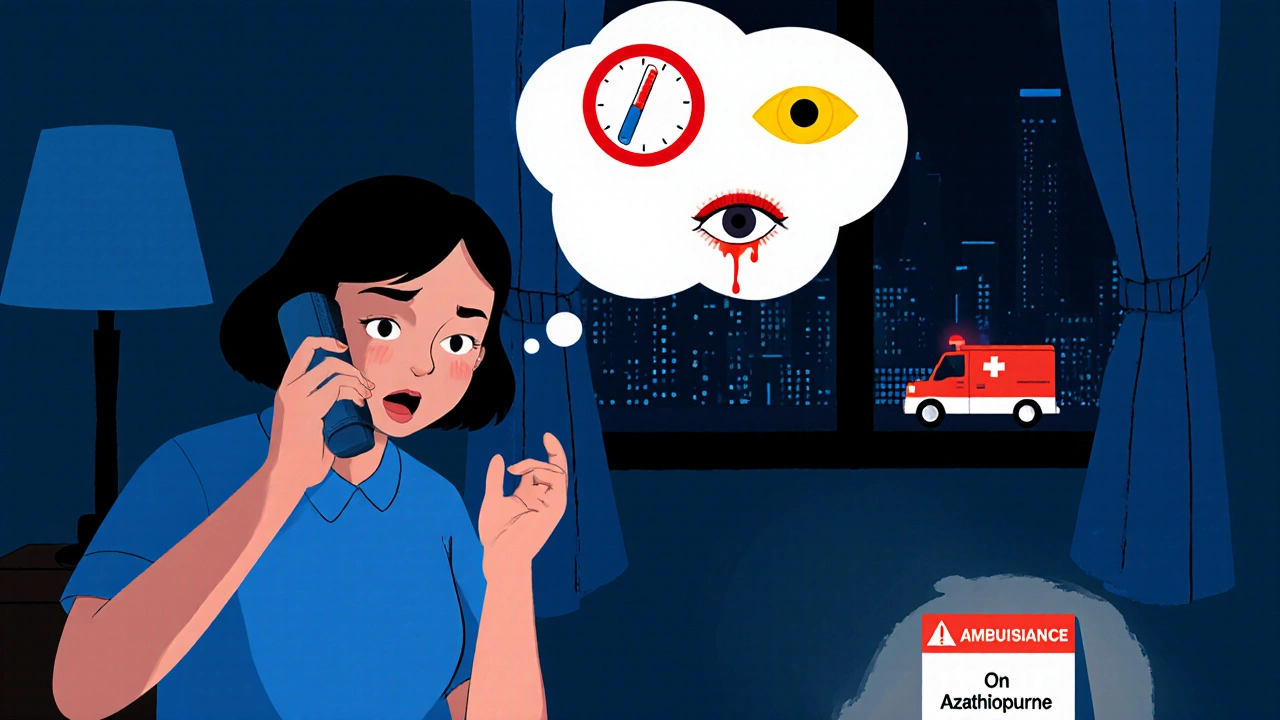Azathioprine Caregiver Guide: Practical Tips to Support Patients
 Oct, 26 2025
Oct, 26 2025
Ever felt helpless watching a loved one wrestle with a medication that seems like a mystery? Azathioprine is one of those drugs - powerful, life‑changing, but also a source of worry for patients and the people who care for them. This guide walks you through what the medicine does, the risks that pop up, and how you can become the steady hand your family member needs.
What is Azathioprine?
Azathioprine is a synthetic immunosuppressant that interferes with DNA synthesis in rapidly dividing cells, especially white blood cells. It was first approved in the 1960s and today is a cornerstone for managing several chronic conditions.
Why Do People Take It?
Two big groups rely on azathioprine:
- Patients with Autoimmune disease conditions where the immune system mistakenly attacks the body, such as rheumatoid arthritis, lupus, or inflammatory bowel disease.
- Recipients of an Organ transplant surgical procedure where a donor organ is placed into a recipient, requiring lifelong suppression of immune rejection.
In both cases, the goal is to dial down the immune response enough to stop tissue damage, but not so much that the body becomes defenseless.
How Does It Work?
Azathioprine gets converted inside cells into 6‑mercaptopurine, which then blocks the production of purines - the building blocks of DNA. Fewer purines mean fewer white blood cells can multiply, and the immune system quiets down. Think of it as turning down the volume on a radio that’s constantly blasting.

Typical Monitoring Schedule
Because the drug treads a fine line, regular check‑ups are non‑negotiable. Here’s a quick snapshot of what labs look like:
| Test | Frequency | What It Shows |
|---|---|---|
| Complete Blood Count (CBC) | Every 2‑4 weeks initially, then every 3 months | White blood cell and platelet counts - low levels signal bone‑marrow suppression |
| Liver Function Tests (ALT, AST) | Every 2‑4 weeks initially, then every 3 months | Detect hepatotoxicity early |
| Kidney Function (creatinine, eGFR) | Every 6 months | Ensure drug clearance isn’t impaired |
| Thiopurine Metabolite Levels | When dose adjustments are considered | Help personalize dosing and reduce toxicity |
Ask the healthcare team to share the results with you. Having the numbers in front of you makes it easier to spot trends and act fast.
Common Side Effects and Red Flags
Most people experience mild nausea or fatigue, but a few issues need immediate action. Keep an eye on:
- Infection risk: Recurrent colds, persistent fever, or unusual bruising could mean the immune system is too suppressed.
- Liver irritation: Dark urine, yellowing of skin or eyes, or persistent abdominal pain should trigger a doctor call.
- Blood‑related problems: Unexplained bleeding, severe fatigue, or sore throat may signal low blood counts.
When any of these appear, call the Healthcare provider the doctor, nurse, or pharmacist overseeing the patient’s treatment right away.
Practical Tips for Caregivers
Here’s a toolbox of actions you can take, organized by daily, weekly, and monthly habits.
- Medication Management
- Use a pill organizer labeled with days and times.
- Set phone alarms or smartwatch reminders for each dose.
- Keep a log of missed or extra doses - a simple notebook works.
- Infection Prevention
- Wash hands thoroughly before handling medication or food.
- Avoid crowded places when flu season peaks.
- Ensure all household members are up‑to‑date on Vaccination immune‑boosting shots such as flu, COVID‑19, and pneumococcal vaccines recommended for immunocompromised individuals.
- Lifestyle Adjustments
- Limit alcohol - even a few drinks can increase liver toxicity.
- Encourage a balanced diet rich in proteins, fruits, and vegetables to support blood cell production.
- Gentle exercise (walking, yoga) keeps circulation good without over‑exerting the body.
- Emotional Support
- Listen without trying to solve everything; sometimes a caring ear is all that’s needed.
- Join patient‑focused support groups - the shared stories reduce isolation.
- Help with practical chores (groceries, appointments) to lower stress levels.
- Communication with the Care Team
- Prepare a brief summary before each appointment: new symptoms, lab results, medication changes.
- Ask for written instructions on what to do if a side effect escalates.
- Keep contact details of the pharmacist handy - they can catch drug interactions early.

Checklist for Caregivers
- ✔️ Have a current list of all meds (dose, timing, purpose).
- ✔️ Schedule and attend all lab appointments - bring previous results for comparison.
- ✔️ Store azathioprine at room temperature, away from moisture and direct sunlight.
- ✔️ Keep an emergency contact list: primary doctor, rheumatologist, transplant surgeon, nearest hospital.
- ✔️ Review vaccination status every six months.
When to Seek Immediate Help
If any of these red‑flag signs show up, don’t wait for the next clinic visit:
- Temperature above 38°C (100.4°F) that lasts more than 24 hours.
- Severe abdominal pain or persistent vomiting.
- Bleeding that won’t stop after 10 minutes (nosebleed, gum bleed, etc.).
- Sudden yellowing of skin or eyes.
Call emergency services or head straight to the nearest A&E department. Let the staff know the patient is on azathioprine - it changes triage priorities.
Key Takeaways
- Azathioprine is a potent immunosuppressant used for autoimmune diseases and organ transplants.
- Regular blood and liver tests keep the therapy safe; keep a copy of results.
- Watch for infection signs, liver irritation, and blood‑cell drops - act fast.
- Set up simple medication reminders, limit alcohol, stay up‑to‑date on vaccinations, and keep open lines with the healthcare team.
- A concise caregiver checklist can turn anxiety into confidence.
Can I stop azathioprine if side effects become bothersome?
Never stop abruptly. Talk to the prescribing Healthcare provider first; they may taper the dose or switch to another drug.
Is it safe for my loved one to get the flu shot while on azathioprine?
Yes, inactivated vaccines like the flu shot are recommended. Live vaccines (e.g., certain shingles shots) usually require a pause in therapy. Always confirm with the doctor.
How long does it take for azathioprine to start working?
Therapeutic effects can appear after 2‑4 weeks, but full benefit often takes 3‑6 months, especially for autoimmune conditions.
What foods should I avoid while my family member takes azathioprine?
Alcohol should be limited, as it adds liver strain. Also avoid raw or undercooked meats and unpasteurized dairy to reduce infection risk.
Can other medications interact with azathioprine?
Yes. Allopurinol, certain antibiotics (e.g., sulfonamides), and warfarin can raise toxicity. Keep a complete medication list and share it with the pharmacist.
What should I do if a lab result shows low white blood cells?
Contact the prescribing doctor immediately. They may pause the drug, reduce the dose, or order a repeat CBC within a few days.

sarah basarya
October 26, 2025 AT 19:57Honestly, watching someone wobble through azathioprine feels like a tragic theater of endless waiting.
Samantha Taylor
October 26, 2025 AT 20:14The pharmacokinetics of azathioprine are not exactly a mystery; within hours the prodrug converts to 6‑mercaptopurine, which then disrupts purine synthesis.
Consequently, clinicians routinely monitor CBC and liver enzymes every few weeks to preempt hematologic or hepatic toxicity.
It is also prudent to assess thiopurine methyltransferase activity beforehand, lest you inadvertently overdose a patient with a genetic deficiency.
While the guide lists the basics, the real art lies in dose titration based on metabolite levels, a nuance often omitted in lay summaries.
Joe Langner
October 26, 2025 AT 20:30Look, caring for someone on azathioprine can feel like trying to juggle flaming torches while walking a tightrope.
Remember to keep that pill organizer front‑and‑center-if you lose a dose, the immune system can go berserk.
And hey, don’t forget to breathe; the stress of monitoring labs can wear you down, so take a minute to sip tea and reset.
Ben Dover
October 26, 2025 AT 20:47One must acknowledge the inherent peril of a drug that simultaneously saves and endangers; the literature inexorably underscores the fine line between therapeutic immunosuppression and iatrogenic immunodeficiency.
Therefore, the recommendation to perform bi‑weekly CBCs is not a bureaucratic inconvenience but a statistically substantiated safeguard.
Any deviation from this regimen without rigorous justification borders on clinical negligence.
Ben Durham
October 26, 2025 AT 21:04From a cultural standpoint, it’s essential to recognize that families from diverse backgrounds may have differing comfort levels with frequent blood draws.
Offering clear explanations in the patient’s native language and involving community health workers can bridge that gap.
Also, storing azathioprine away from humidity preserves its potency-something many overlook.
Tony Stolfa
October 26, 2025 AT 21:20Listen, the guide’s checklist is cute, but if you’re not setting alarms on every damn device you own, you’re basically gambling with your loved one’s life.
Stop being complacent and slap that pill schedule on the fridge, the bathroom mirror, heck-on the toaster if you have to.
Joy Dua
October 26, 2025 AT 21:37Azathioprine, in its silent ferocity, compels us to contemplate the paradox of medicine: a molecule that curtails disease while inviting vulnerability.
Thus, the caregiver’s role transcends administration; it becomes a vigilant steward of fragile equilibrium.
Holly Kress
October 26, 2025 AT 21:54It’s helpful to keep a simple log of symptoms and lab results-just a bullet list on a sticky note can make appointments far less stressful for everyone involved.
Barna Buxbaum
October 26, 2025 AT 22:10Pro tip: sync your phone’s calendar with the lab schedule and set a reminder a day before. That way you never miss a CBC, and the doc can spot trends early.
Abbey Travis
October 26, 2025 AT 22:27Remember, you’re not alone in this-online support groups can share practical hacks and emotional boost when you’re feeling overwhelmed.
Miracle Zona Ikhlas
October 26, 2025 AT 22:44Stay consistent with medication timing; routine is your best ally.
Chris L
October 26, 2025 AT 23:00When you notice a subtle shift-like a lingering fatigue or a faint bruise-jot it down immediately; early detection can prevent a cascade of complications.
Charlene Gabriel
October 26, 2025 AT 23:17First and foremost, caring for someone on azathioprine is a marathon, not a sprint, and the journey begins with solid preparation.
Make sure you have an up‑to‑date medication list that includes dosages, timing, and the purpose of each drug; this list should be accessible both digitally and on paper.
Next, establish a reliable schedule for laboratory monitoring-CBC, liver function tests, and kidney panels-because catching abnormal values early can be lifesaving.
Set reminders on multiple devices; a phone alarm, a calendar alert, and even a sticky note on the fridge create redundancy that reduces human error.
When the labs come back, compare them to previous results; trends matter more than isolated numbers, so keep a simple spreadsheet or notebook for quick reference.
If any red‑flag appears-persistent fever, unexplained bruising, jaundice, or severe fatigue-contact the prescribing physician without delay; do not wait for the next scheduled appointment.
In addition, educate yourself about drug interactions; medications such as allopurinol, certain antibiotics, and warfarin can amplify azathioprine toxicity, so a pharmacist’s review is essential.
Limit alcohol intake, as it can exacerbate liver strain, and avoid raw or undercooked animal products to lower infection risk.
Encourage a balanced diet rich in protein, fruits, and vegetables to support hematopoiesis, but also be mindful of foods that might interfere with drug metabolism.
Physical activity is beneficial-gentle walks or yoga improve circulation without overtaxing the body.
Equally important is emotional support; listening without trying to fix every problem can provide a much‑needed outlet for the patient’s anxieties.
Consider joining a caregiver support group, whether online or in‑person, to share experiences and coping strategies.
Maintain open lines of communication with the entire care team; bring a concise summary to each appointment outlining new symptoms, medication changes, and recent lab values.
Ask for written instructions on managing side effects, so you have a clear plan if something escalates.
Finally, remember to take care of yourself-regular sleep, healthy meals, and moments of relaxation will keep you resilient and better equipped to support your loved one.
Gary Campbell
October 26, 2025 AT 23:34Everyone loves to trust the “official” guidelines, but they rarely mention the hidden agenda of pharmaceutical companies pushing azathioprine as a one‑size‑fits‑all solution while downplaying long‑term carcinogenic risks.
It’s wise to question why the monitoring intervals are so lax in some protocols; the faster they want you to “stabilize,” the sooner they can monetize follow‑up visits.
Stay skeptical, read the primary studies, and consider alternative immunomodulators that aren’t under the same corporate umbrella.
renee granados
October 26, 2025 AT 23:50Azathioprine can mess with your blood and liver, so you have to watch for any weird signs and call the doctor fast.